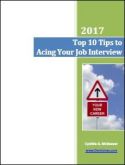Resume Writing Tips
Here they are...our top 10 Resume Writing Tips. Follow these quick tips to stay out of
trouble as you put your resume together.
Be sure to check out all of the great advice we provide
on resume development. A good place to start is with How to Write a Resume. From here, you can
take an in depth look at each section that should appear on your resume. This is not the time to take shortcuts! Make sure
that you take the time to understand the information presented. It might mean the difference between getting the interview
and wondering why the phone doesn't ring.
In the meantime, here are 10 resume writing tips that you need to follow:
Tip #1
Use a chronological resume format. Recruiters and hiring managers
will thank you. This is the easiest way for a hiring manager to see where you've worked and what
you've done.
Tip #2
Create your resume in Microsoft Word. Almost everyone will be able to open your document.
Do not use a PDF file. These are more cumbersome to open, and sometimes just fail to
open - or worse, freeze up. You run the risk of being deleted!
Tip #3
Proofread your resume. Do not rely on spell check. It will not catch words that are
misused. Think "their" and "there". Don't be fooled by basic resume writing tips. These inadvertent
mistakes will knock you out of the running quickly.
Tip #4
Do not misrepresent your experience or your academic background. You can certainly
package your experience in a way that is favorable to you, but don't lie. Academic credentials
are easy to check. There's nothing more distressing than getting to the employment alter - where
the employer wants to make you an offer and you want to accept - only to find out that the MBA
on your resume is a figment of your imagination.
Tip #5
Have a healthy respect for white space in your document. Make sure it's readable.
It should look professional. Use a clean font (arial/verdana); mix it up with a little bold
and italics. Use bullet points. Use 1 inch margins (although your Top of Page margin can be
set at one half inch). Insert a few horizontal rules. If you take a look at our Resume Samples,
you'll see that you don't have to go overboard with these ideas to produce an effective
document.
Tip #6
Focus on accomplishments rather than duties. Your resume should not read like a job
description. It should showcase your achievements. See Create a Resume
for more detail on this point. We all know what a Sales Manager does.
We'll be more interested in what you did to distinguish yourself in that role.
Tip #7
Use a Summary Statement rather than an objective. An objective can severely limit your
options. A short, narrative summary of your key skills will be more effective at getting
you past a screener. Our Resume Objectives section will explain why.
Tip #8
Incorporate metrics into your presentation where possible. Think about the scope of
your responsibility in terms of number of people managed, the size of the budget you manage,
your sales targets, your track record in achieving sales targets, etc.
Tip #9
Personal information does not belong on a resume. Please don't share your age, height,
weight, marital status and similar information. And, don't show me a picture! Employers are
not supposed to make judgments based on this kind of information - and it's illegal for them to
ask about these things. Don't create a potential problem for them.
Tip #10
Do not include your references on your resume. Prepare a separate reference sheet that you
can provide to employers if asked. Our Reference section goes into detail on what information
to share.
Follow these resume writing tips and be on your
way to more interviews!







